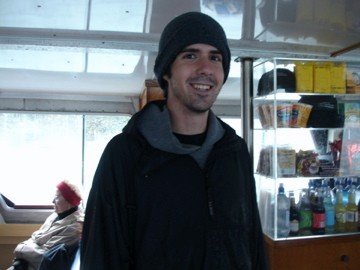
#1. Inglourious Basterds. Part 2: Offense
First and foremost, I judge movies on their writing. There are other elements that can enhance and detract from my experience, but without good writing, chances are I'm not going to like it and with good writing, chances are that I am. I really believe that everything ultimately comes down to the writing, though I suppose I'm a bit biased in that sense.
So, it should be no coincidence that the #1 movie of the year as determined by me, is also the best written* movie of the year.
* Also, no surprise, I think Up and A Serious Man were the next best written movies of the year.
Tarantino takes a lot of heat, probably rightfully so, for his apparent glorification of violence. And I won't pretend otherwise, Inglourious Basterds has its share of excessive and unnecessary violence. But, honestly, I could take it or leave it. While many people love Tarantino's style and his slick trademarks, what I like about Tarantino is how razor sharp his writing his. The plotting of Basterds is brilliant, even in its slightly unorthodox five (?) chapter format; the dialogue is meticulous, memorable, and (when appropriate) hilarious; and, make no mistake, the man knows how to write a scene.
[SPOILERS AHEAD]
As such, a perfect example of this is the movie's opening, in which the devious Col. Hans Landa (Oscar-fav Christopher Waltz) talks to the owner of a farm and convinces him to betray the Jews that he's hiding. Landa comes in and asks for a glass of milk, which he downs completely in one raising of his glass. Then, at first, when Landa asks the farmer to speak in English, we think that it's just Tarantino making it easier for the audience, but it's then revealed that it's a calculated move by Landa to disguise his conversation from the Jews that he knows are probably listening in...it's pretty good stuff. Landa gradually chips away at the farmer's resistance, bringing him to tears only with his words. It's a very powerful and fantastically written scene.
But, Tarantino later reminds us of this scene when Landa meets Shoshanna (Melanie Laurent) the only survivor from that fateful day, and Landa orders a glass of milk again, this simple act sending terror into both Shoshanna and the audience. Does he remember? Is he toying with her? It's an excruciating scene. The further detail of Landa playfully scolding Shoshanna to wait for the cream as well before she can eat her strudel is a great example of the kind of thought and detail Tarantino puts in his writing.
Another of the most impressive scenes comes when Landa realizes who the double-agent is. It all starts when Tarantino makes the decision to have the double-agent be the beautiful actress Bridgett von Hammersmark (Diane Kruger). The whole scene in the bar when she meets up with the Americans is excellent overall, but the path of one of the Nazis asking for autograph (which had to happen) on the napkin and then Landa finding that napkin in the remains after the meeting goes south is seemingly inevitable, but the previous steps are so effortlessly and naturally occurring that the audience forgets that she left it. It's all so perfectly planned.
While I could recount the genius in so many of these scenes (which, when all put together make for an amazing tapestry) I would be remiss if I didn't mention the general humor that Tarantino injects this script with. Pitt's Lt. Aldo in particular has such distinct, amusing lines that almost all of his scenes are laugh-out-loud funny. While occasionally Tarantino goes for overt humor (Aldo and a couple of the Basterds trying to pose as Italians) most of it is just creating a great character whose normal way of speaking is wildly entertaining. Landa's strength of character is the same way, though what is comedy for Aldo is replaced by shrewdness for Landa.
Also of note are the many interesting parallels Tarantino creates between his movie itself and what goes on in it. As I briefly mentioned yesterday, there is sharing of attitude between Tarantino and Aldo in regard to the treatment of Nazis, but there is more. For example, Tarantino creates a film that kills Hitler and defeats Nazi Germany and, in the film, Shoshanna and her beau literally kill the Nazis with reels of film by burning them alive in a movie theater. Furthermore, the Nazis cheer for a violent propaganda film in which soldiers are gunned down, just as the real audience is/is about to cheer for a violent propaganda-like scene in which soldiers/officials are gunned down. This, to me, is evidence that (as discussed in Pt. 1) Tarantino fully understands the kind of movie he is making, and he tries to leave clues for the viewer to convey this.
Some call Tarantino's long scenes and overly-clever dialogue self-indulgent, but I think it's self-indulgent in the way John Bonham's solo in "Moby Dick" is self-indulgent or Seinfeld's "The Chinese Restaurant" is. That is, it is, but sometimes you just have let the masters do their thing.
And Tarantino knows this. He may be a weird dude (at least from I can glean from interviews, etc.) but he can write a movie. And, so it's only fitting that Basterds ends with Tarantino-proxy Aldo looking into the camera at his last "artistic" endeavor and saying...
"I think this might just be my masterpiece."

No comments:
Post a Comment